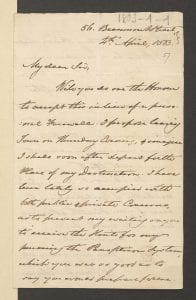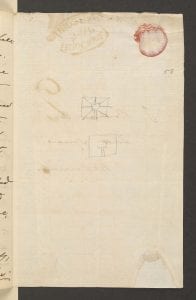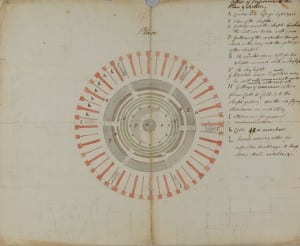‘Position not form’: a square panopticon prison?
By Tim Causer, on 10 November 2016
We generally assume that Bentham’s panopticon prison, had it been constructed, would have been a circular building. This is, of course, a wholly fair and unsurprising assumption given the numerous plans and drawings which Bentham had prepared when lobbying the government, and the lengthy descriptions of the proposed building in his writings. However, a letter written in 1803 might suggest that Bentham did not consider the shape of the building all that important, and even recognised that its circular nature may have been counterproductive.
During either late December 1802 or early January 1803, Bentham had sent the First and Second Letters to Lord Pelham (i.e. a part of Bentham’s critique of convict transportation, Panopticon versus New South Wales) to David Collins, the former Judge-Advocate of the colony. Bentham had, of course, relied heavily upon Collins’s Account of the English Colony in New South Wales in his own writings about the colony and transportation. Collins had returned to England in 1796, and on 4 January 1803 was commissioned as lieutenant-governor of a proposed new settlement at Port Phillip (in modern-day Victoria).
On 27 January Bentham invited Collins to dinner, where he would also meet ‘My friend Charles Bunbury who like you and me is one of the fancy (I mean not the Pidgeon fancy but the Convict fancy)’. Collins had evidently expressed an in interest in constructing a prison in the new settlement under his command, and Bentham suggested if he was serious then ‘I flatter myself that by means of my Brother and the professional assistance he has at his command’ he could provide Collins with draughts of the panopticon, which would be more helpful than the general outline contained in his book Panopticon; or the Inspection House.
Bentham did indeed approach his brother Samuel, then Inspector-General of Naval Works, on the matter on 22 February. He noted that he had dined with Collins on three occasions, who had proven ‘very good par with me’. Jeremy hoped that Samuel might provide Collins with draughts, as with his book ‘and a little νους [nous], he might be able to do without a draught; but the νους, I fear, is wanting.’
The draughts do not appear to have been prepared by the time Collins, on 4 April, wrote to Bentham ‘in lieu of a personal Farewell’. He planned to leave London on 7 April and would sail again for the Antipodes, and having been so busy ‘with both public and private Concerns’ he had been prevented from receiving ‘the Hints for my pursuing the Panopticon System, which you was so good as to say you would prepare for me.’ However, Collins assured Bentham ‘that my Prison shall if possible be a circular one.’

David Collins’s farewell letter to Bentham, 4 April 1803. Add. MS 33,544 fo. 57 (British Library Bentham Paperss)
Bentham seemed quite fond of Collins, writing in reply the following day that ‘I have never been fond of leave-taking [… and] in the present instance it would have been a painful one.’ He teased Collins about the nature of his mission, hoping that in a few years he would ‘return to us in all the glory of triumphant colonization laden with the spoils of the insulated continent—kangaroo and wombat skins.’ However, he took on a chiding tone when he turned to the topic of prisons:
your time for thinking seriously of them is not yet come: if it had been, you would not, in alluding to the Panopticon construction, have taken circularity for the characteristic principle of it. Position not form: centrality of the keeper’s lodge, with a commanding view of every part of the space into which a prisoner can introduce himself (by the help of peep-holes, blinds, or any other contrivance which will enable the keepers to see upon occasion without being seen,) such is the real characteristic principle.
Context was also important: Bentham recognised that even in London, a circular panopticon was ‘attended with difficulties, which in general operate so as to increase the expense.’ In the new settlement under Collins’s command, ‘with your limited resources—I should expect to find these difficulties insurmountable’. Bentham supposed that Collins would have to rely upon logs rather than bricks and:
Logs grow in strait lines, or thereabouts […] Your circle, if of logs, would at any rate, be a polygon, if it were not a square. But why should it not be a square? If you have an open yard, as I suppose you will, the boundary wall may be composed off the four sides of another square, concentric with, and therefore including, the two others.
It is intriguing to note that in a blank space at the end of Collins’s farewell letter to Bentham (see above). someone has sketched, very roughly in pencil, what could be a square panopticon. It seems unlikely that this was Collins himself, given that he had a circular prison in mind. In signing off, Bentham wished Collins well and hoped to be one of ‘the select, who are to receive the earliest communication of your res gestae [i.e. Collins’s deeds].’

The blank space and possible ‘square panopticon’ at the end of Collins’s farewell letter to Bentham. Add. MS 33,544 fo. 58 (British Library Bentham Papers)
Collins reached Port Phillip in October 1803, though soon decided that it was an unsuitable place for a settlement and relocated to the Derwent River in Van Diemen’s Land. Collins, overworked and exhausted, was found dead at Government House in Hobart Town on 24 March 1810, aged 54. The only evidence that Bentham heard from Collins in Van Diemen’s Land is contained in a letter of November 1805, in which he noted the arrival of a ‘packet of seeds’ from Collins. Bentham forwarded these the Foreign Secretary Charles James Fox; according to his niece, Caroline, Fox’s garden was ‘in the highest state of perfection, and he fonder of it than of the H. of Commons.’ (As a final aside, in 1805 Bentham proposed to Caroline Fox but was very gently rejected – though that is a story for another day).
[See The Correspondence of Jeremy Bentham (The Collected Works of Jeremy Bentham), ed. J.R. Dinwiddy, vol. vii., pp. 188, 188-90, 205, 219-20, 220-23, and 335-7]
One Response to “‘Position not form’: a square panopticon prison?”
- 1
 Close
Close



[…] Bentham Project has been busy this week too. Have you seen Dr Tim Causer’s blog on Bentham’s square Panopticon? And check out our Twitter page to see what went on at last […]